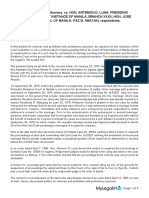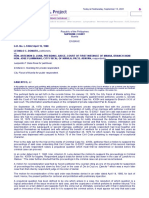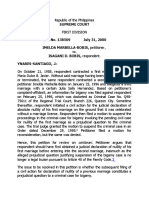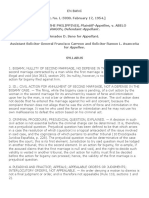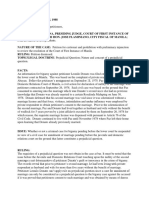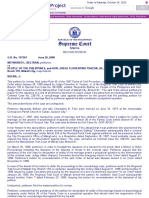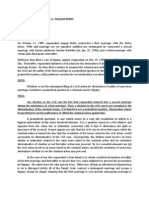Donato Vs Luna
Donato Vs Luna
Uploaded by
Earleen Del RosarioCopyright:
Available Formats
Donato Vs Luna
Donato Vs Luna
Uploaded by
Earleen Del RosarioOriginal Description:
Original Title
Copyright
Available Formats
Share this document
Did you find this document useful?
Is this content inappropriate?
Copyright:
Available Formats
Donato Vs Luna
Donato Vs Luna
Uploaded by
Earleen Del RosarioCopyright:
Available Formats
Republic of the Philippines
SUPREME COURT
Manila
EN BANC
G.R. No. L-53642 April 15, 1988
LEONILO C. DONATO, petitioners,
vs.
HON. ARTEMON D. LUNA, PRESIDING JUDGE,
COURT OF FIRST INSTANCE OF MANIIA,
BRANCH XXXII HON. JOSE FLAMINIANO, CITY
FISCAL OF MANILA; PAZ B. ABAYAN,
respondents.
Leopoldo P. Dela Rosa for petitioner.
Emiterio C. Manibog for private respondent.
City Fiscal of Manila for public respondent.
GANCAYCO, J.:
In this petition for certiorari and prohibition with
preliminary injunction, the question for the
resolution of the Court is whether or not a
criminal case for bigamy pending before the
Court of First Itance of Manila should be
suspended in view of a civil case for annulment of
marriage pending before the Juvenile and
Domestic Relations Court on the ground that the
latter constitutes a prejudicial question. The
respondent judge ruled in the negative. We
sustain him.
The pertinent facts as set forth in the records
follow. On January 23, 1979, the City Fiscal of
Manila acting thru Assistant City Fiscal Amado N.
Cantor filed an information for bigamy against
herein petitioner, Leonilo C. Donato with the
Court of First Instance of Manila, docketed as
Criminal Case No. 43554 and assigned to Branch
XXXII of said court. The information was filed
based on the complaint of private respondent Paz
B. Abayan.
On September 28, 1979, before the petitioner's
arraignment, private respondent filed with the
Juvenile and Domestic Relations Court of Manila a
civil action for declaration of nullity of her
marriage with petitioner contracted on
September 26, 1978, which action was docketed
as Civil Case No. E-02627. Said civil case was
based on the ground that private respondent
consented to entering into the marriage, which
was petitioner Donato's second one, since she
had no previous knowledge that petitioner was
already married to a certain Rosalinda R.
Maluping on June 30, 1978. Petitioner Donato's
answer in the civil case for nullity interposed the
defense that his second marriage was void since
it was solemnized without a marriage license and
that force, violence, intimidation and undue
influence were employed by private respondent
to obtain petitioner's consent to the marriage.
Prior to the solemnization of the subsequent or
second marriage, petitioner and private
respondent had lived together and deported
themselves as husband and wife without the
benefit of wedlock for a period of at least five
years as evidenced by a joint affidavit executed
by them on September 26, 1978, for which
reason, the requisite marriage license was
dispensed with pursuant to Article 76 of the New
Civil Code pertaining to marriages of exceptional
character.
Prior to the date set for the trial on the merits of
Criminal Case No. 43554, petitioner filed a motion
to suspend the proceedings of said case
contending that Civil Case No. E-02627 seeking
the annulment of his second marriage filed by
private respondent raises a prejudicial question
which must first be determined or decided before
the criminal case can proceed.
In an order dated April 7, 1980. Hon. Artemon D.
Luna denied the motion to suspend the
proceedings in Criminal Case No. 43554 for
bigamy. Respondent judge's basis for denial is the
ruling laid down in the case of Landicho vs.
Relova. 1 The order further directed that the
proceedings in the criminal case can proceed as
scheduled.
A motion for reconsideration was flied by herein
petitioner thru counsel citing as one of his
grounds for suspension of proceedings the ruling
laid down by this Court in the case of De la Cruz
vs. Ejercito 2 which was a much later case than
that cited by respondent judge in his order of
denial.
The motion for reconsideration of the said order
was likewise denied in an order dated April 14,
1980, for lack of merit. Hence, the present
petition for certiorari and prohibition with
preliminary injunction.
A prejudicial question has been defined to be one
which arises in a case, the resolution of which
question is a logical antecedent of the issue
involved in said case, and the cognizance of
which pertains to another tribunal. 3 It is one
based on a fact distinct and separate from the
crime but so intimately connected with it that it
determines the guilt or innocence of the accused,
and for it to suspend the criminal action, it must
appear not only that said case involves facts
intimately related to those upon which the
criminal prosecution would be based but also that
in the resolution of the issue or issues raised in
the civil case, the guilt or innocence of the
accused would necessarily be determined. 4 A
prejudicial question usually comes into play in a
situation where a civil action and a criminal
action may proceed, because howsoever the
issue raised in the civil action is resolved would
be determinative juris et de jure of the guilt or
innocence of the accused in a criminal case. 5
The requisites of a prejudicial question do not
obtain in the case at bar. It must be noted that
the issue before the Juvenile and Domestic
Relations Court touching upon the nullity of the
second marriage is not determinative of
petitioner Donato's guilt or innocence in the
crime of bigamy. Furthermore, it was petitioner's
second wife, the herein private respondent Paz B.
Abayan who filed the complaint for annulment of
the second marriage on the ground that her
consent was obtained through deceit.
court therefore, has not abused
much less gravely abused, its
discretion in failing to suspend the
hearing as sought by petitioner.
Petitioner Donato raised the argument that the
second marriage should have been declared null
and void on the ground of force, threats and
intimidation allegedly employed against him by
private respondent only sometime later when he
was required to answer the civil action for
anulment of the second marriage. The doctrine
elucidated upon by the case of Landicho vs.
Relova 6 may be applied to the present case. Said
case states that:
In the case at bar, petitioner has not even
sufficiently shown that his consent to the second
marriage has been obtained by the use of
threats, force and intimidation.
The mere fact that there are
actions to annul the marriages
entered into by the accused in a
bigamy case does not mean that
"prejudicial questions" are
automatically raised in civil actions
as to warrant the suspension of the
case. In order that the case of
annulment of marriage be
considered a prejudicial question to
the bigamy case against the
accused, it must be shown that the
petitioner's consent to such
marriage must be the one that was
obtained by means of duress, force
and intimidation to show that his
act in the second marriage must be
involuntary and cannot be the
basis of his conviction for the crime
of bigamy. The situation in the
present case is markedly different.
At the time the petitioner was
indicted for bigamy on February 27,
1963, the fact that two marriage
ceremonies had been contracted
appeared to be indisputable. And it
was the second spouse, not the
petitioner who filed the action for
nullity on the ground of force,
threats and intimidation. And it was
only on June 15, 1963, that
petitioner, as defendant in the civil
action, filed a third-party complaint
against the first spouse alleging
that his marriage with her should
be declared null and void on the
ground of force, threats and
intimidation. Assuming that the
first marriage was null and void on
the ground alleged by petitioner,
the fact would not be material to
the outcome of the case. Parties to
the marriage should not be
permitted to judge for themselves
its nullity, for the same must be
submitted to the judgment of the
competent courts and only when
the nullity of the marriage is so
declared can it be held as void, and
so long as there is no such
declaration the presumption is that
the marriage exists. Therefore, he
who contracts a second marriage
before the judicial declaration of
nullity of the first marriage
assumes the risk of being
prosecuted for bigamy. The lower
Petitioner calls the attention of this Court to the
fact that the case of De la Cruz vs. Ejercito is a
later case and as such it should be the one
applied to the case at bar. We cannot agree. The
situation in the case at bar is markedly different.
In the aforecited case it was accused Milagros
dela Cruz who was charged with bigamy for
having contracted a second marriage while a
previous one existed. Likewise, Milagros dela Cruz
was also the one who filed an action for
annulment on the ground of duress, as contradistinguished from the present case wherein it
was private respondent Paz B. Abayan,
petitioner's second wife, who filed a complaint for
annulment of the second marriage on the ground
that her consent was obtained through deceit
since she was not aware that petitioner's
marriage was still subsisting. Moreover, in De la
Cruz, a judgment was already rendered in the
civil case that the second marriage of De la Cruz
was null and void, thus determinative of the guilt
or innocence of the accused in the criminal case.
In the present case, there is as yet no such
judgment in the civil case.
Pursuant to the doctrine discussed in Landicho vs.
Relova, petitioner Donato cannot apply the rule
on prejudicial questions since a case for
annulment of marriage can be considered as a
prejudicial question to the bigamy case against
the accused only if it is proved that the
petitioner's consent to such marriage was
obtained by means of duress, violence and
intimidation in order to establish that his act in
the subsequent marriage was an involuntary one
and as such the same cannot be the basis for
conviction. The preceding elements do not exist
in the case at bar.
Obviously, petitioner merely raised the issue of
prejudicial question to evade the prosecution of
the criminal case. The records reveal that prior to
petitioner's second marriage on September 26,
1978, he had been living with private respondent
Paz B. Abayan as husband and wife for more than
five years without the benefit of marriage. Thus,
petitioner's averments that his consent was
obtained by private respondent through force,
violence, intimidation and undue influence in
entering a subsequent marriage is belled by the
fact that both petitioner and private respondent
executed an affidavit which stated that they had
lived together as husband and wife without
benefit of marriage for five years, one month and
one day until their marital union was formally
ratified by the second marriage and that it was
private respondent who eventually filed the civil
action for nullity.
Another event which militates against petitioner's
contentions is the fact hat it was only when Civil
Case No. E-02627 was filed on September 28,
1979, or more than the lapse of one year from
the solemnization of the second marriage that
petitioner came up with the story that his consent
to the marriage was secured through the use of
force, violence, intimidation and undue influence.
Petitioner also continued to live with private
respondent until November 1978, when the latter
left their abode upon learning that Leonilo Donato
was already previously married.
In the light of the preceding factual
circumstances, it can be seen that the
respondent Judge did not err in his earlier order.
There is no pivotal issue that must be preemptively resolved in Civil Case No. E-02627
before proceedings in the criminal action for
bigamy can be undertaken.
Accordingly, there being no prejudicial question
shown to exit the order of denial issued by the
respondent judge dated April 14, 1980 should be
sustained.
WHEREFORE, in view of the foregoing, the instant
petition is hereby DISMISSED for lack of merit. We
make no pronouncement as to costs.
SO ORDERED.
You might also like
- Motions, Affidavits, Answers, and Commercial Liens - The Book of Effective Sample DocumentsFrom EverandMotions, Affidavits, Answers, and Commercial Liens - The Book of Effective Sample DocumentsRating: 4.5 out of 5 stars4.5/5 (17)
- The Book of Writs - With Sample Writs of Quo Warranto, Habeas Corpus, Mandamus, Certiorari, and ProhibitionFrom EverandThe Book of Writs - With Sample Writs of Quo Warranto, Habeas Corpus, Mandamus, Certiorari, and ProhibitionRating: 5 out of 5 stars5/5 (10)
- Answer Ad CautelamDocument7 pagesAnswer Ad CautelamChristoffer Allan Liquigan100% (3)
- GUILLERMA S. SILVA v. CONCHITA S. LODocument3 pagesGUILLERMA S. SILVA v. CONCHITA S. LOShine Dawn InfanteNo ratings yet
- Sample Motion to Vacate, Motion to Dismiss, Affidavits, Notice of Objection, and Notice of Intent to File ClaimFrom EverandSample Motion to Vacate, Motion to Dismiss, Affidavits, Notice of Objection, and Notice of Intent to File ClaimRating: 5 out of 5 stars5/5 (23)
- CHAN WEI LOON v. PP & ANOTHER APPEALDocument27 pagesCHAN WEI LOON v. PP & ANOTHER APPEALWestNo ratings yet
- Rolando Landicho Vs Lorenzo Relova 22 SCRA 731 Case DigestDocument2 pagesRolando Landicho Vs Lorenzo Relova 22 SCRA 731 Case DigestJERROM ABAINZANo ratings yet
- 27.donato Vs Luna G.R.No. L-53642, 1988-04-15, 160 SCRA 441Document3 pages27.donato Vs Luna G.R.No. L-53642, 1988-04-15, 160 SCRA 441Lester AgoncilloNo ratings yet
- Leopoldo P. Dela Rosa For Petitioner. Emiterio C. Manibog For Private Respondent. City Fiscal of Manila For Public RespondentDocument42 pagesLeopoldo P. Dela Rosa For Petitioner. Emiterio C. Manibog For Private Respondent. City Fiscal of Manila For Public RespondentBatang Yagit KrisTininayNo ratings yet
- Donato Vs LunaDocument4 pagesDonato Vs LunaEller-JedManalacMendozaNo ratings yet
- Donato vs. LunaDocument5 pagesDonato vs. LunaAnna BautistaNo ratings yet
- 6.donato v. Luna, G.R. No. 53642, (April 15, 1988), 243 PHIL 584-591Document3 pages6.donato v. Luna, G.R. No. 53642, (April 15, 1988), 243 PHIL 584-591Jeorge VerbaNo ratings yet
- Donato Vs Luna 160 SCRA 441Document2 pagesDonato Vs Luna 160 SCRA 441Kelly RoxasNo ratings yet
- Donato V LunaDocument7 pagesDonato V LunaTrisha Paola TanganNo ratings yet
- Case DigestDocument3 pagesCase DigestEmille Blanco ElesterioNo ratings yet
- G R - No - L-53642Document1 pageG R - No - L-53642RywNo ratings yet
- DONATO vs. LUNA G.R. No. L-53642 April 15, 1988: FactsDocument2 pagesDONATO vs. LUNA G.R. No. L-53642 April 15, 1988: FactsQuimark Estose QuinlogNo ratings yet
- Landicho Vs RelovaDocument6 pagesLandicho Vs Relovakikhay11No ratings yet
- Leopoldo P. Dela Rosa For Petitioner. Emiterio C. Manibog For Private Respondent. City Fiscal of Manila For Public Respondent. RelovaDocument3 pagesLeopoldo P. Dela Rosa For Petitioner. Emiterio C. Manibog For Private Respondent. City Fiscal of Manila For Public Respondent. RelovaJohn Basil ManuelNo ratings yet
- 2000 Marbella Bobis - v. - Bobis PDFDocument7 pages2000 Marbella Bobis - v. - Bobis PDFKimberly GangoNo ratings yet
- Leonilo Donato, vs. Hon Artemon Luna andDocument2 pagesLeonilo Donato, vs. Hon Artemon Luna andAllen SoNo ratings yet
- Marbella-Bobis V BobisDocument5 pagesMarbella-Bobis V BobisakosivansotNo ratings yet
- IMELDA MARBELLA-BOBIS, Petitioner, vs. ISAGANI D. BOBIS, RespondentDocument10 pagesIMELDA MARBELLA-BOBIS, Petitioner, vs. ISAGANI D. BOBIS, RespondentAM CruzNo ratings yet
- Donato v. LunaDocument3 pagesDonato v. LunaYuri NishimiyaNo ratings yet
- Bobis V BobisDocument7 pagesBobis V BobisrjapsNo ratings yet
- People v. Aragon, 94 Phil 357Document3 pagesPeople v. Aragon, 94 Phil 357dondzNo ratings yet
- G.R. No. L-15315 (Merced v. Diez)Document4 pagesG.R. No. L-15315 (Merced v. Diez)VIRILITER AGITENo ratings yet
- 1954 People - v. - Aragon20210424 12 1apveu3Document3 pages1954 People - v. - Aragon20210424 12 1apveu3Roland ApareceNo ratings yet
- LANDICHO VS RELOVA Case DigestDocument1 pageLANDICHO VS RELOVA Case DigestLylo BesaresNo ratings yet
- Civil 1Document4 pagesCivil 1art_reinaNo ratings yet
- Landicho Vs Relova Case DigestDocument3 pagesLandicho Vs Relova Case DigestWilfredNo ratings yet
- Donato Vs LunaDocument2 pagesDonato Vs LunaRosabella MusicNo ratings yet
- ObliCon DigestMidterms RANDocument15 pagesObliCon DigestMidterms RANRaziel Xyrus FloresNo ratings yet
- CrimproDocument5 pagesCrimproJulian GuevarraNo ratings yet
- 3 Bobis V BobisDocument2 pages3 Bobis V BobisCai CarpioNo ratings yet
- Jurisprudence Bigamy Second Marriage Prejudicial QuestionDocument1 pageJurisprudence Bigamy Second Marriage Prejudicial QuestionjoyNo ratings yet
- Jurisprudence Bigamy Second Marriage Prejudicial QuestionDocument1 pageJurisprudence Bigamy Second Marriage Prejudicial QuestionjoyNo ratings yet
- (G.R. No. 138509, July 31, 2000) Imelda Marbella-Bobis, Petitioner, vs. Isagani D. Bobis, RespondentDocument5 pages(G.R. No. 138509, July 31, 2000) Imelda Marbella-Bobis, Petitioner, vs. Isagani D. Bobis, Respondentkai lumagueNo ratings yet
- V. Prejudicial QuestionsDocument5 pagesV. Prejudicial Questionscess_rmtNo ratings yet
- Landicho CaseDocument3 pagesLandicho CaseClaudia Rina LapazNo ratings yet
- Bobis Vs BobisDocument3 pagesBobis Vs BobisHazel Grace AbenesNo ratings yet
- Te V., CaDocument6 pagesTe V., CaAngelineNo ratings yet
- People vs. AragonDocument4 pagesPeople vs. AragonEnverga Law School Corporation Law SC DivisionNo ratings yet
- PERSONS - Cases Part 8 (Bobis-Ancheta)Document119 pagesPERSONS - Cases Part 8 (Bobis-Ancheta)Nurlailah AliNo ratings yet
- Landicho V RelovaDocument3 pagesLandicho V RelovaTina BNo ratings yet
- Landicho V. Relova FactsDocument16 pagesLandicho V. Relova Facts62991No ratings yet
- Case Digest For Prejudicial Question CasesDocument4 pagesCase Digest For Prejudicial Question CasesAntonio BartolomeNo ratings yet
- Landicho vs. RelovaDocument3 pagesLandicho vs. RelovaAnna BautistaNo ratings yet
- Beltran Vs PeopleDocument3 pagesBeltran Vs Peoplehainako3718No ratings yet
- Independent Civil Actions: Facts: Rolando Cueno Went To His Aunt's House To Ask ForDocument2 pagesIndependent Civil Actions: Facts: Rolando Cueno Went To His Aunt's House To Ask ForKrizia Marie Dancel GangoNo ratings yet
- Marbella-Bobis V BobisDocument3 pagesMarbella-Bobis V BobisMaverick Jann Esteban100% (1)
- GR Nr. 137567 Beltran Vs People of The PhilsDocument6 pagesGR Nr. 137567 Beltran Vs People of The PhilsAsiongNo ratings yet
- Pp. 7 CrimDocument143 pagesPp. 7 CrimgleeNo ratings yet
- Marbella-Bobis V BobisDocument2 pagesMarbella-Bobis V BobisJohn Basil ManuelNo ratings yet
- Bobis VS BobisDocument4 pagesBobis VS BobisencinajarianjayNo ratings yet
- PAFR Beltran1Document3 pagesPAFR Beltran1Bianca Alana Hizon LimjucoNo ratings yet
- Bobis v. Bobis G.R. No. 138509Document4 pagesBobis v. Bobis G.R. No. 138509salemNo ratings yet
- Landicho Vs Relova - Bigamy and AnnulmentDocument3 pagesLandicho Vs Relova - Bigamy and Annulmentsandra mae bonrustroNo ratings yet
- Case Digest Marbella-Bobis V. BobisDocument3 pagesCase Digest Marbella-Bobis V. BobisJc IsidroNo ratings yet
- Cases For PrelimsDocument12 pagesCases For PrelimsJaidee SanchezNo ratings yet
- Defense of Petitioner: Filed A Motion To SuspendDocument9 pagesDefense of Petitioner: Filed A Motion To SuspendKatrina Vianca DecapiaNo ratings yet
- U.S. v. Sun Myung Moon 532 F.Supp. 1360 (1982)From EverandU.S. v. Sun Myung Moon 532 F.Supp. 1360 (1982)No ratings yet
- Shooter Long Drink Creamy Classical TropicalDocument1 pageShooter Long Drink Creamy Classical TropicalEarleen Del RosarioNo ratings yet
- Dela Llana Vs CoaDocument2 pagesDela Llana Vs CoaEarleen Del RosarioNo ratings yet
- JurisdictionDocument23 pagesJurisdictionEarleen Del RosarioNo ratings yet
- Makalintal Vs PetDocument3 pagesMakalintal Vs PetEarleen Del RosarioNo ratings yet
- Transpo CasesDocument16 pagesTranspo CasesEarleen Del RosarioNo ratings yet
- Labor Case DigestDocument4 pagesLabor Case DigestEarleen Del RosarioNo ratings yet
- Letter of Intent - OLADocument1 pageLetter of Intent - OLAEarleen Del RosarioNo ratings yet
- UsbFix ReportDocument904 pagesUsbFix ReportEarleen Del RosarioNo ratings yet
- Biggest Loser ChallengeDocument1 pageBiggest Loser ChallengeEarleen Del RosarioNo ratings yet
- Tariff and Customs LawsDocument6 pagesTariff and Customs LawsEarleen Del RosarioNo ratings yet
- SIL Cases Chapters 1 and 2Document13 pagesSIL Cases Chapters 1 and 2Earleen Del RosarioNo ratings yet
- (Previous: Inherent Powers of The State Police Power) : Syllabus (v.4.0 / First Semester, SY 2018-2019)Document4 pages(Previous: Inherent Powers of The State Police Power) : Syllabus (v.4.0 / First Semester, SY 2018-2019)Vic CajuraoNo ratings yet
- Trial of Raja NandkumarDocument4 pagesTrial of Raja NandkumarAnurathna MathivananNo ratings yet
- United States of America, for the Use and Benefit of D'Agostino Excavators, Inc. v. The Heyward-Robinson Company, Inc. And Maryland Casualty Company,defendants-Appellants, 430 F.2d 1077, 2d Cir. (1970)Document16 pagesUnited States of America, for the Use and Benefit of D'Agostino Excavators, Inc. v. The Heyward-Robinson Company, Inc. And Maryland Casualty Company,defendants-Appellants, 430 F.2d 1077, 2d Cir. (1970)Scribd Government DocsNo ratings yet
- Adarne vs. AldabaDocument9 pagesAdarne vs. AldababogoldoyNo ratings yet
- Art 6 Case 11-17Document43 pagesArt 6 Case 11-17Zyra BaculoNo ratings yet
- Prout v. Starr, 188 U.S. 537 (1903)Document7 pagesProut v. Starr, 188 U.S. 537 (1903)Scribd Government DocsNo ratings yet
- Sec Nelson Response, Plea To JurisdictionDocument15 pagesSec Nelson Response, Plea To JurisdictionBrad JohnsonNo ratings yet
- 6 Digest in The Matter of Haron MelingDocument1 page6 Digest in The Matter of Haron MelingSharon G. Balingit100% (1)
- Bpi Family Savings Bank Vs Spouses VelosoDocument5 pagesBpi Family Savings Bank Vs Spouses VelosoMabelle ArellanoNo ratings yet
- Ivler vs. San PedroDocument2 pagesIvler vs. San PedroJea ulangkayaNo ratings yet
- Viloria vs. Court of Appeals Art 1092Document11 pagesViloria vs. Court of Appeals Art 1092HeidiNo ratings yet
- Preweek Pointers On Evidence by Prof. Manuel RigueraDocument293 pagesPreweek Pointers On Evidence by Prof. Manuel RigueraYsa Tabbu0% (1)
- Daniel Chizoka Mbandangoma V The AttorneyDocument6 pagesDaniel Chizoka Mbandangoma V The Attorneytalk2marvin70No ratings yet
- LLB Practical WritingsDocument52 pagesLLB Practical WritingsVicky NagdevNo ratings yet
- Government vs. AlburalDocument2 pagesGovernment vs. Alburalpoppy2890100% (2)
- O.S.No.26308/2018: in The Court of Xiii Addl. City Civil & Sessions Judge, (CCH-22) Present: Smt. Suvarna K. MirjiDocument13 pagesO.S.No.26308/2018: in The Court of Xiii Addl. City Civil & Sessions Judge, (CCH-22) Present: Smt. Suvarna K. Mirjiraj100% (1)
- Municipality of Pililla, Rizal, PetitionerDocument6 pagesMunicipality of Pililla, Rizal, PetitionerStacy OtazaNo ratings yet
- Petition For Extraordinary Writ of Mandate, Application For Temporary Stay...Document61 pagesPetition For Extraordinary Writ of Mandate, Application For Temporary Stay...robertian100% (3)
- Digest Sereno and CoronaDocument9 pagesDigest Sereno and CoronaElla AquinoNo ratings yet
- Anti-Graft and Corrupt PracticesDocument22 pagesAnti-Graft and Corrupt PracticesEdenFielNo ratings yet
- Lao Gi Chia SR vs. CADocument4 pagesLao Gi Chia SR vs. CAVeraNataaNo ratings yet
- Unravelling The Golden Thread Woolmington in The High Court of AustraliaDocument16 pagesUnravelling The Golden Thread Woolmington in The High Court of AustraliaBony AlieNo ratings yet
- GA Unemployment Class Action ComplaintDocument45 pagesGA Unemployment Class Action ComplaintBarry BrownNo ratings yet
- Ortega vs. OrcineDocument2 pagesOrtega vs. OrcineJoseMarellaNo ratings yet
- Mohd Alias Bin Ibrahim V RHB Bank BHD Anor 2011 3 MLJ 26Document37 pagesMohd Alias Bin Ibrahim V RHB Bank BHD Anor 2011 3 MLJ 26KimiForsakenNo ratings yet
- Criminal Procedures: Federal Laws vs. State LawsDocument3 pagesCriminal Procedures: Federal Laws vs. State LawsMimi GavrilovaNo ratings yet







